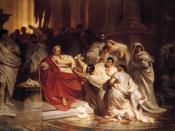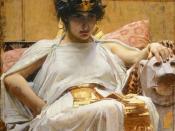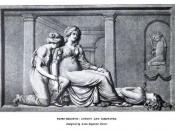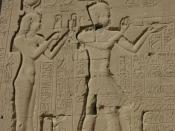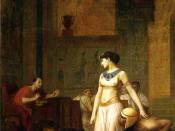Shakespeare attempts to explain the interrelationship of reality behind outward appearance and change. He has remarked two statements regarding the interrelationship of these two themes that run through the play. He has stated that the truth of today is not the truth of tomorrow that nothing is constant and the world is in a state of flux. He has also suggested- that something remains unchanged and when a change of mood occurs, the truth behind these appearances is revealed. Swift Change suggests a play of outward appearance. William Shakespeare has explained the theme of reality behind appearances through his dramatization of change in the play " Antony and Cleopatra". The change in the play are the political situation, Enorbarbus's loyalty, Caesar's change, Antony's change- in his attitude toward Cleopatra and in his valiant nature.
In the play, the political situation changes quickly- the swiftness of the change suggests the truth behind the relationship of the three triumvirates.
The turn of events- the assassination of Pompey, the capture of Lepidus and the condemnation of Antony all occurred quickly. In the swiftness of the change of events- all in favor of Caesar, himself- there is suggestion that Caesar has either suddenly become very fortunate- or he has decided to let his ambitions run wild. By having the change occur quickly and swiftly in a few scenes, William Shakespeare has illustrated that swift unexpected change shows the truth behind the appearance of sincerity, solidity in the relationship of the three triumvirates is very fragile indeed. He has also illustrated how a change in event will bring out the true nature of people- the defeat of pompey means Caesar no longer has any need for Lepidus so he imprisions him out of ambition.
Enorbarbus's loyalty illustrates that the truth of today is not the truth of tomorrow. Enorbarbus appears in the very beginning of the play to be a very devoted follower of Antony, but he too with the change of the tide decides to submit himself to Caesar. This suggests how wavering human nature is. The quick regret and grief that follows re-emphasize the fact.
However, change does not only brings a change in the heart- change also brings out the truth behind outward appearance. Antony's love for Cleopatra is an example. Antony appears to be obsessed with Cleopatra and have good opinions of her and Egypt that is associated with her. But deep inside he is a roman at heart. The change of fortune for Antony leads him to express his true, deep inner opinion of Cleopatra. In the beginning, Antony depicts Cleopatra as a cunning queen, enchanting and deceitful after receiving news of Fulvia's war upon Caesar. The change of the tide- the defeat of Antony- causes him to announce his true feeling of Cleopatra. However, this may be interpreted either side as the truth or again an attitude picked up by Antony as a result of the change- perhaps showing that the truth of today is not the truth of tomorrow.
Through the quick change, pace of the play, the character of Caesar and Antony is shown, contradictory to what they appear in the outside. In the short swift scenes in act four, the truth of Caesar being more in favor of winning is depicted, Antony is shown to be more fateful to be doomed. Antony is also shown to be the true novice in wars- he is unclear about his aim and easily provoked in the fight shows he is a good fighter but not a clever tactician. Caesar, on the other hand, is more tactical- knows that he will lose on land so proposes to battle Antony at sea.
To be contined-Appearance of Rome and its true nature
Through changes- the quick change of scene, the placing of the scenes in Alexandria in Egypt with the scenes of Rome, the idea of truth behind outward appearance is conveyed. Rome does appear to be a somber more business like place, but it doesn't differ from Egypt in the selfish nature of people. Although Caesar talks about the selfish nature of Antony in pursuing his hobby, Caesar is no better in his greed and political ambition.
- characters' action- contradiction
-Melting, dissolution- conclusion paragraph-The imagery of melting runs throughout the play- it suggests the changeable nature of the world, hence emphasizing that outward appearance and truth is temporary- and a person cannot at any time decipher the truth of things. Antony says "let Rome in Tiber melt, and the whole arch of the rang'd empire fall!" " The hearts that spaniel'd me at heels, to whom I gave their wishes, do discandy, melt their sweets on blossoming Egypt"
In conclusion through the quick shift in scenes, the imagery of melting, the changeable nature of Characters are emphasized- which indicates that outward appearance is difficult to decipher because it is always changing, so the truth is almost impossible to reach, that fate too is always shifting and going back to the idea of impossibility to reach the truth, the truth behind Rome, and the truth behind the triumvirates' relationship.
